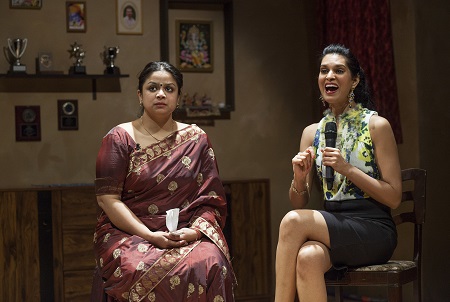
Free Outgoing is a tale of sexual assault lived through a family steeped in tradition, at Toronto’s Factory Theatre
In Free Outgoing (from Nightwood Theatre), disgrace ruins the lives of the widowed Malini and her children after her fifteen year old daughter, Deepa, is filmed sexually by her boyfriend on his phone and the recording spread until it reaches the public internet. It’s set within a Tamil family in the very conservative city of Chennai in India, which means the level of censure from the community is beyond what we would expect in North America. This extremity works to highlight some of the same issues we face here, possibly in subverted or insidious ways. The most striking thing about the play is that Deepa herself is not a character.
During the show I kept wanting to hear from Deepa. I felt very conflicted that she literally had no voice in the play, just as real life teenage girls are never given a voice to speak about their own experiences when this sort of story erupts. But ultimately I think it was a brave risk for playwright Anupama Chandrasekhar to take, to make this social problem of the silencing of young women’s sexuality so apparent onstage.
Deepa’s absence also made me concerned that she may not be alive behind that door. Given that our North American experience with these situations has so often ended in suicide, Deepa became like a Schrodinger’s cat. The tension of her absence built along with that of Malini and brother/son Sharan as their situation became more and more dire.
As usual with Nightwood, the set, designed by Anna Treusch is fantastic. It’s a full, realistic interior, very detailed with lovely touches like a window that obscurely shows when people approach, and depart from, the front door. This feature is just rather nice at first, but it has more impact later in the play, when the family is holed up in the apartment with media and angry mobs stalking their door, and the housing complex’s tenants’ association trying to evict them. But the door that matters more is the door to Deepa’s room. When open, it shows a small slice of a teenage girl’s room – clothes hanging on hooks, posters. But more often it’s closed, and sometimes I could see shadows in the small crack at floor level that make it apparent that Deepa was on the other side, listening to her life and choices be vociferously debated and condemned.
Free Outgoing openly criticises the patriarchal society that destroys the lives of women who are seen to be sexual. But, while giving us a family with no patriarch, Chandrasekhar creates for us a mother who has done damage to her children. Malini’s self-serving nature is hinted at from the beginning – in our first intriction to Malini she is using her charms to manipulate Ramesh, a co-worker who is sweet on her.
This could be interpreted as blaming the mother and lack of a father for a daughter’s wanton ways, but Chandrasekhar steers us away from that with the description of what’s in the video. It’s not the sex act itself that’s telling, particularly to an audience like myself, who understands that it’s perfectly natural for a teenager to feel desire. It is that Deepa seems to have been inviting the video-taping; she is not only consenting, she wants to be seen. Because she lives in a home where her mother does not see her, only the grades she gets and the trophies she wins. This point is again brought home by Deepa never appearing onstage.
Sharan is also not seen by his mother, but in a different way. I have a lot of analysis about the familial relationships depicted in the play and how they relate to patriarchy, misogyny, aggression, loss, privilege, and a host of other things. My companion and I for the night had a lot to say about the show as we had beer and salad afterward. This is a show that makes you think.
The only real complaint we had was that we were intellectually interested, but not emotionally invested. There isn’t a character to feel for in Free Outgoing, except for Deepa who is conspicuously absent. But the more I sit with it, the more I think not all shows have to be emotional. I think there’s a value in approaching this topic, which could be very emotional indeed, from the distance Chandrasekhar provides.
Anusree Roy did a great job as Malini, with the unpleasant aspects of her character bubbling up through her increasing desperation. Although a crucial reveal of some of Malini’s flaws comes from a line delivered by Ellora Patnaik, playing a representative of the tenants’ association. The three women in the cast, rounded out by Asha Vijaysingham as a slick and heatless media vulture, stand out with excellent performances.
Kelly Thornton’s direction is as tight as Toronto audiences have every reason to expect from her by now. The transitions were delightful, always smooth and nuanced, and often added to the audience’s understanding of the tension, and even usually-hidden tenderness, between the son and his mother.
Details
- Free Outgoing, produced by Nightwood Theatre, is playing until February 16th at the Factory Theatre Mainstage, 125 Bathurst Street
- Performances are Tuesday to Saturday at 8:00 pm, Saturday and Sunday at 2:00 pm
- Tickets range from $25 to $45
-
Purchase tickets through the Factory Theatre Box Office at 416-504-9971 or online at nightwoodtheatre.net
Photo of Anusree Roy and Asha Vijayasingham by John Lauener.
